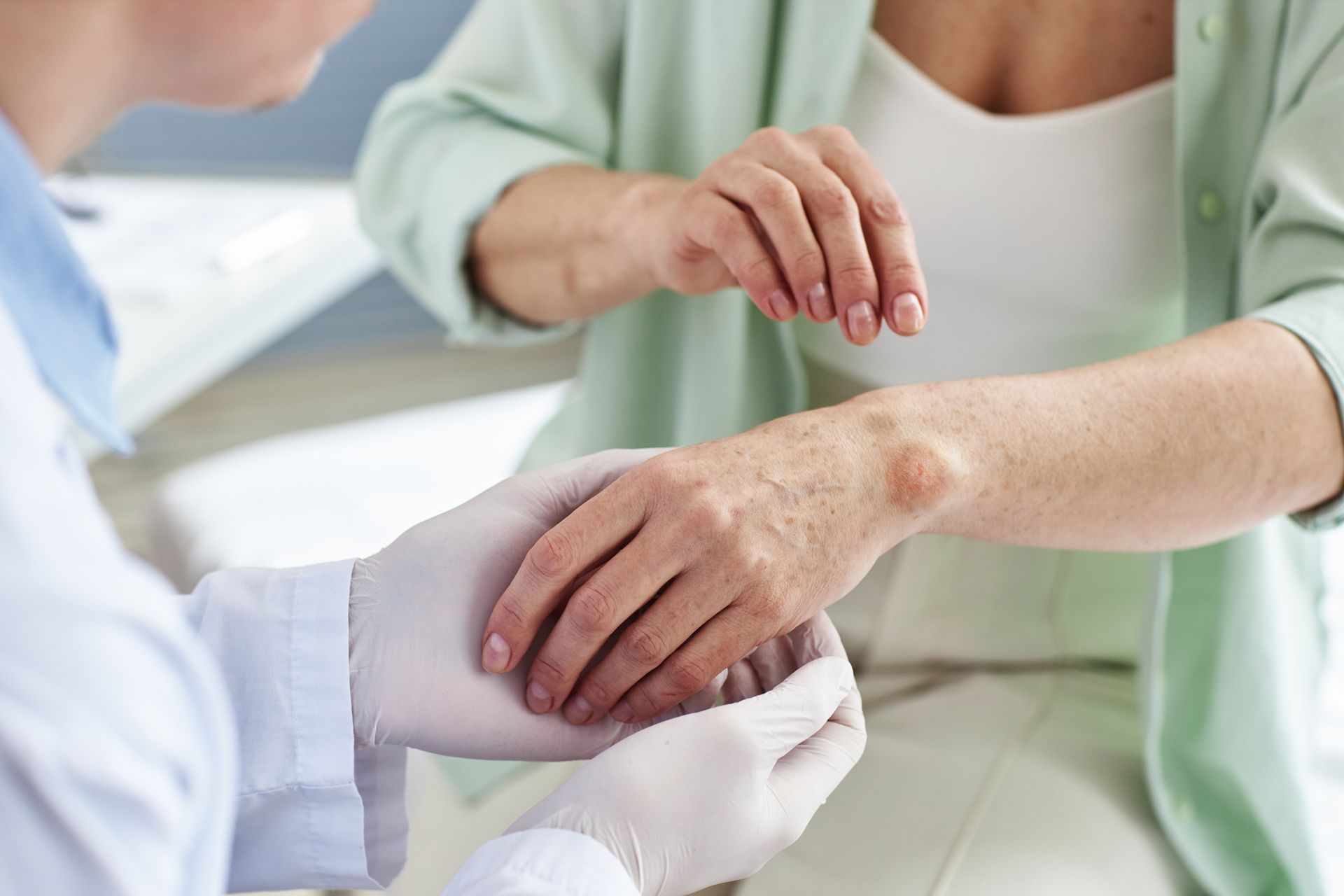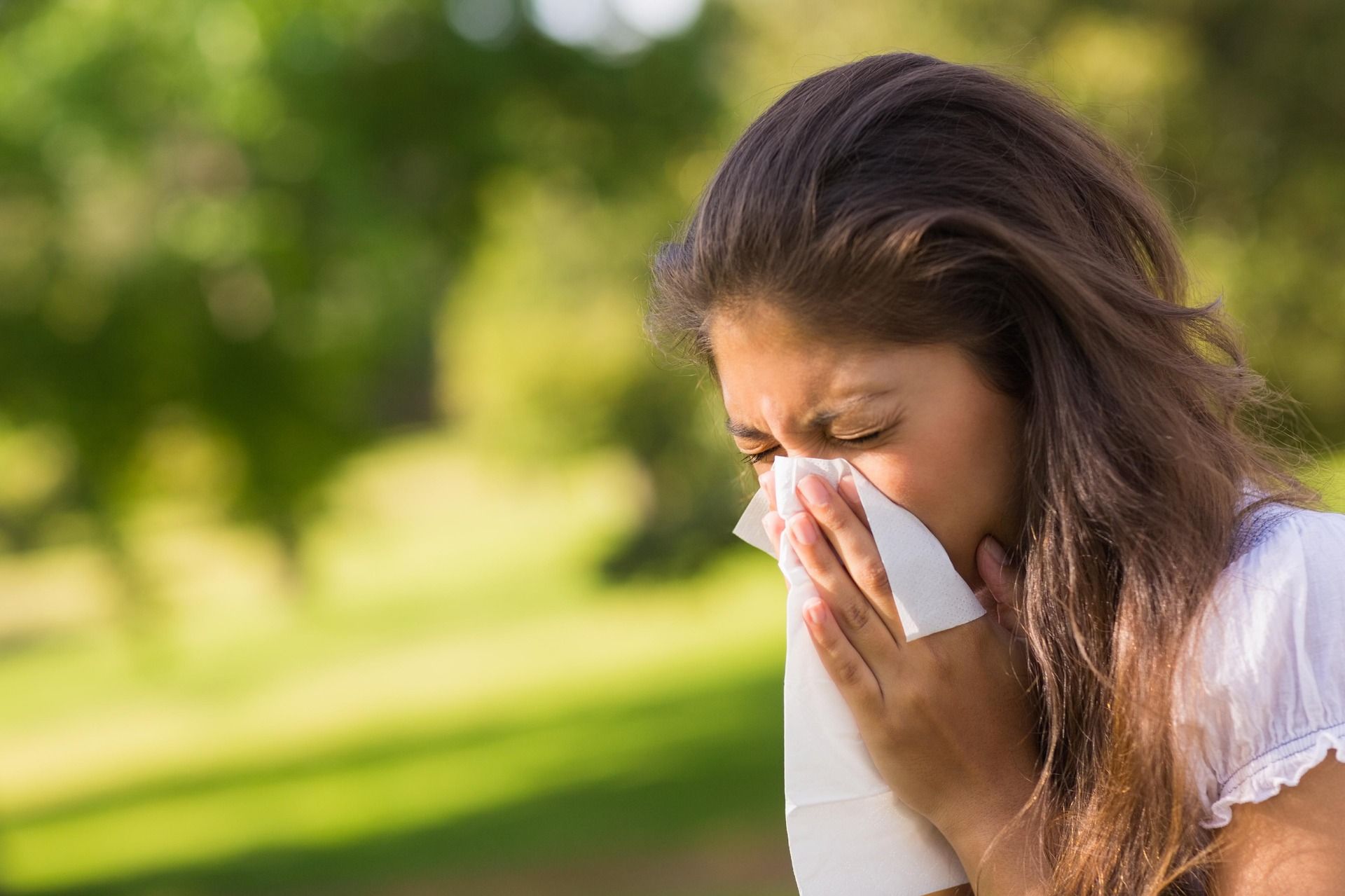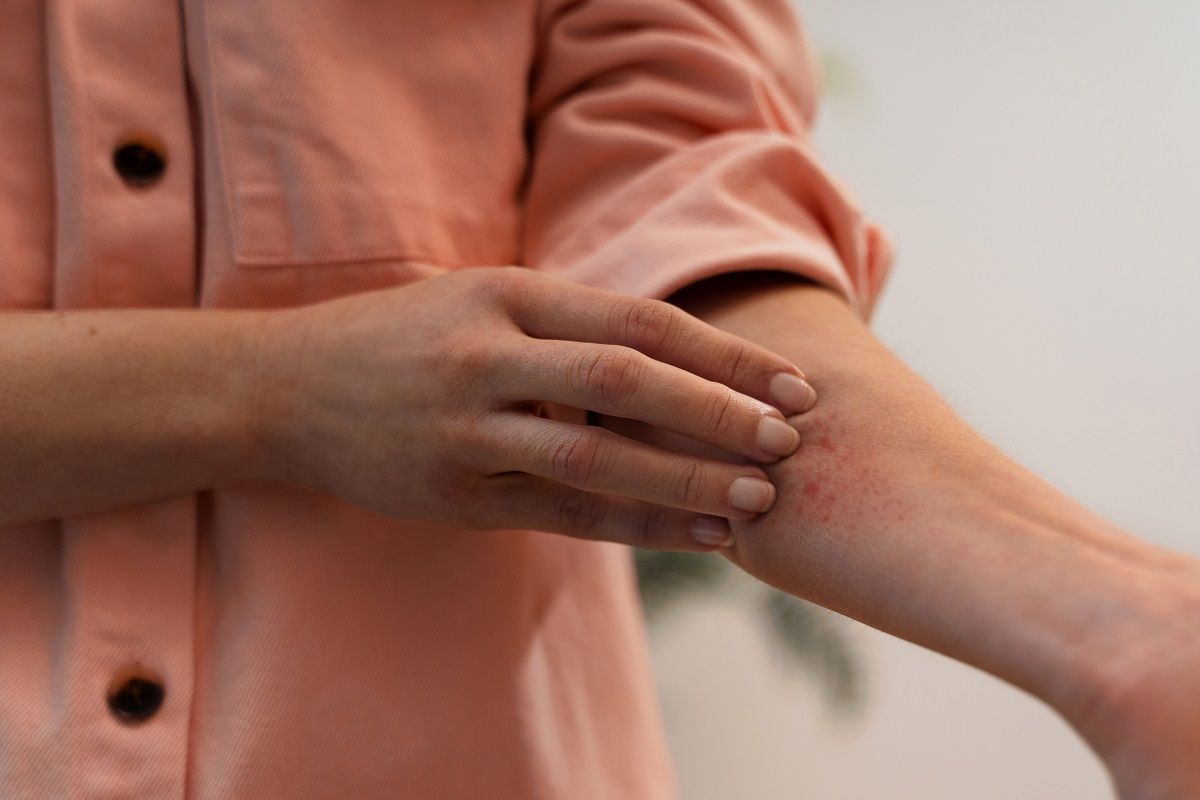
Wearing jewelry, using skincare products, or coming into contact with household chemicals can lead to itchy, red, and irritated skin, causing frustration and discomfort. This persistent irritation might be more than just a minor annoyance—it could be contact dermatitis. Many unknowingly struggle with this common skin issue, and the constant discomfort disrupts daily life, making simple activities challenging.
But there’s good news. By understanding what triggers contact dermatitis and learning how to manage it, you can reclaim your comfort and confidence. Ready to uncover the secrets to healthier skin? With specialized knowledge and personalized care, our Asthma and Allergy Affiliates experts can help you start your journey towards healthier skin today!
Take the First Step Now
What is Contact Dermatitis?
Contact dermatitis occurs when your skin reacts to a substance it comes into contact with, leading to an inflammatory response. Simply put, this happens when your body's defense system wrongly tags a harmless substance as dangerous, leading to a defensive response. This reaction manifests as a dermatitis rash characterized by red, itchy, and sometimes blistered skin.
Two Main Types of Contact Dermatitis
1. Irritant Contact Dermatitis
Irritant contact dermatitis occurs when a substance physically damages the skin’s outer layer. Common irritants include:
- Harsh soaps
- Detergents
- Solvents
2. Allergic Contact Dermatitis
Allergic contact dermatitis happens when your immune system reacts to an allergen, even if you’ve previously been in contact with the substance without issues. Common allergens include:
- Nickel
- Fragrances
- Certain plant oils
Symptoms can vary from mild to severe, and things can escalate if you don't address them. Your skin might crack, blisters could form, and if you let it go untreated, you might even end up with secondary infections. Severe cases can disrupt your daily activities, making it difficult to focus at work or enjoy leisure activities. Early identification and proper management are crucial to prevent complications and maintain skin health.
Identifying Common Causes of Contact Dermatitis

- Household Chemicals
Everyday cleaning products often contain harsh chemicals like bleach, detergents, and disinfectants that can irritate your skin. Even seemingly benign “natural” products might harbor allergens triggering contact dermatitis. Prioritize label-checking and opt for hypoallergenic alternatives whenever feasible.
2. Cosmetics and Skincare Products
Your beauty rituals might harbor hazards, too. Makeup, lotions, and perfumes often contain parabens, fragrances, and preservatives—common allergens that can incite reactions. Before applying new products, test a patch on a small skin area. Seek items labeled “fragrance-free” and “for sensitive skin” to mitigate risks.
3. Jewelry and Accessories
Your cherished accessories may secretly be causing distress. Nickel, a metal pervasive in jewelry, emerges as a primary allergen. If a rash appears where your rings, earrings, or necklaces touch your skin, nickel may be the culprit. Swap out causative pieces for hypoallergenic or nickel-free alternatives to preempt flare-ups.
4. Clothing and Fabrics
Even your wardrobe isn’t exempt from scrutiny. Certain fabrics and dyes possess skin-irritating properties. Synthetic materials, wool, and laundry detergents can provoke contact dermatitis rashes. Prioritize natural fibers like cotton and opt for gentle, fragrance-free detergents to safeguard your skin’s well-being.
5. Plants and Outdoor Allergens
Nature’s beauty hides skin assailants like poison ivy, oak, and sumac, notorious culprits of contact dermatitis. Participating in outdoor hobbies like gardening or hiking can accidentally introduce you to these irritants. To minimize risks, shield yourself by donning lengthy sleeves and gloves and familiarizing yourself with these plants.
Practical Strategies to Relieve Your Skin
Dealing with skin dermatitis may be challenging, but you can find relief and regain control over your skin health with the right approach. Here are some strategies to help you manage this condition effectively:
- Avoiding Triggers
Identifying and avoiding triggers is paramount in managing contact dermatitis. Keeping a diary of your flare-ups helps pinpoint irritants, allowing you to minimize exposure and reduce reactions. Avoiding allergens significantly decreases the frequency and severity of your dermatitis flare-ups, making the journey to healthy skin much smoother!
- Taking Over-the-Counter Treatments
Over-the-counter treatments like hydrocortisone creams and antihistamines can be highly effective for immediate relief from itching and inflammation. These medications work to alleviate symptoms and promote healing. However, if your symptoms persist or worsen, it’s crucial to consult with an allergist in Tampa for more robust prescription options tailored to your specific needs.
- Trying Some Natural Remedies
In addition to traditional treatments, home remedies can provide natural relief for skin dermatitis symptoms. Oatmeal baths and cool compresses relieve itching and swelling. At the same time, aloe vera and coconut oil may help moisturize and calm irritated skin. Before trying any home remedies, it’s essential to patch-test them to ensure they don’t exacerbate your condition.
- Consulting Professionals
If your symptoms persist despite trying over-the-counter treatments and home remedies, it’s time to seek help from a professional. Our team of the best allergy doctors at Allergy Affiliates specializes in skin allergy treatment. We offer personalized allergic dermatitis treatment plans tailored to your unique needs, ensuring effective management of your condition and long-term skin health.
By implementing these tips and reaching out to experts, you can successfully manage contact dermatitis and experience skin that's both healthier and happier. Don’t let dermatitis control your life—take proactive steps to reclaim your skin health today.
Tips for Long-Term Management
Preventing future flare-ups of contact dermatitis is crucial for maintaining healthy, comfortable skin. By incorporating these strategies into your daily routine, you can minimize the risk of recurrence and enjoy long-term relief.
- Educate Yourself
Understanding the common allergens and irritants that trigger contact dermatitis is the first step to prevention. Take the time to educate yourself about these substances and how to avoid them daily. Keep yourself updated on the latest products and treatments that can provide relief and assist you in better managing your condition.
- Following a Skin Care Routine
A gentle and consistent skincare routine is essential for soothing and protecting skin. Use mild, fragrance-free cleansers and moisturizers to keep your skin hydrated and minimize irritation. Protective barrier creams can shield against potential allergens, maintaining your skin’s health and integrity.
- Ensure Regular Check-Ups
Regular visits to your allergist are essential for staying ahead of your allergies and preventing minor irritations from escalating into severe problems. During these appointments, your allergist can monitor your condition, assess your symptoms, and adjust your treatment plan.
Your Roadmap to Clear, Comfortable Skin!
Understanding the common causes of contact dermatitis and how to manage them empowers you to live comfortably. You can ensure your skin stays healthy and free from irritation by recognizing what sets it off, utilizing effective treatments, and seeking expert advice.
Ready to take control of your skin health? Don't let contact dermatitis disrupt your life any longer. Schedule a consultation with us at Allergy Affiliates today. Call us at 941-792-4151 and start your journey to clear, comfortable skin!
Clear and Healthy Skin Awaits
Contact Us
Monday: 8AM–5:30PM
Tuesday: 8AM–5:30PM
Wednesday: 8AM–4:30PM
Thursday: 8AM–4:30PM
Friday: 7:30AM–4PM
Saturday: Closed
Sunday: Closed
Monday: 8AM–5:30PM
Tuesday: 8AM–5:30PM
Wednesday: 8AM–4:30PM
Thursday: 8AM–4:30PM
Friday: 7:30AM–4PM
Saturday: Closed
Sunday: Closed
Make an Appointment
Contact Us
We will get back to you as soon as possible.
Please try again later.
Contact Us
Tuesday:
- 9:00 a.m. - 12.30 p.m.
- 2:00 p.m. – 5:30 p.m.
Thursday:
- 8:00 a.m. – 11:30 a.m.
- 1:00 p.m. – 4:30 p.m.
Monday:
- 9:00 a.m. - 12.30 p.m.
- 2:00 p.m. – 5:30 p.m.
Wednesday:
- 8:00 a.m. – 11:30 a.m.
- 1:00 p.m. – 4:30 p.m.
Friday:
- 7:30 a.m. – 11:30 a.m.
- 1:00 p.m. – 4:00 p.m.
Make an Appointment
Contact Us
We will get back to you as soon as possible.
Please try again later.










